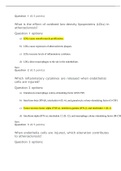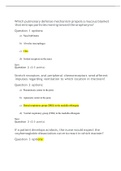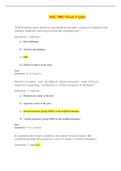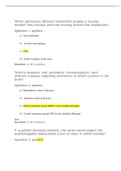NSG 5003 Week 5 Quiz (NSG 5003)
South University
All 4 results
Sort by
NSG 6001 Final Exam Study Guide ABDOMINAL AORTIC ANEURYSM Know the causes of an abdominal aortic aneurysm. P493 Understand risk factors for abdominal aortic aneurysm. P494 Development of AAA

-
NSG 5003 Week 2 Knowledge Check Quiz
- Exam (elaborations) • 9 pages • 2021
-
- $10.49
- + learn more
NSG 5003 Week 2 Knowledge Check Quiz The immune response is characterize by the activation of which two types of immunocytes? The chief functions of antibodies are to protect the host by which of the following mechanisms?

-
NSG 5003 Week 6 Knowledge Check
- Exam (elaborations) • 9 pages • 2021
-
- $5.49
- + learn more
NSG 5003 Week 6 Knowledge Check Both iron and folate are vital to meet both the woman’s needs and those of the developing baby. They play an active role in the development of: Within the first year of life, it is normal for a childs: A 63-year-old woman with diabetes notes that she has a general feeling of tiredness and a loss of appetite. The physician collects a CBC in addition to normal diabetic laboratory tests. The results indicate anemia, and she is referred to a hematologist. The h...

-
NSG 5003 Week 5 Quiz (VERIFIED)
- Exam (elaborations) • 9 pages • 2021
-
- $9.49
- + learn more
1. Which pulmonary defense mechanism propels a mucous blanket that entraps particles moving toward the oropharynx? 2. Stretch receptors and peripheral chemoreceptors send afferent impulses regarding ventilation to which location in the brain? 3. If a patient develops acidosis, the nurse would expect the oxyhemoglobin dissociation curve to react in which manner? 4. How is most carbon dioxide (CO2) in the blood transported? 5. The sternocleidomastoid and scalene muscles are referred to...

$6.50 for your textbook summary multiplied by 100 fellow students... Do the math: that's a lot of money! Don't be a thief of your own wallet and start uploading yours now. Discover all about earning on Stuvia



